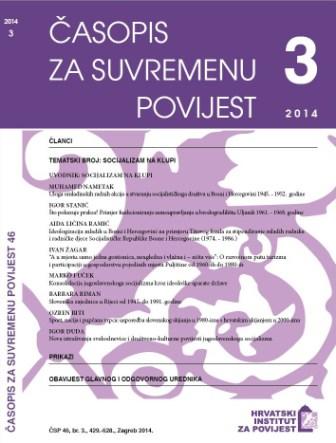Slovenska zajednica u Rijeci od 1945. do 1991. godine
Slovenian Community in Rijeka from 1945 to 1991
Author(s): Barbara RimánSubject(s): History
Published by: Hrvatski institut za povijest
Keywords: Slovenian community in Rijeka; Slovenian House – Cultural and Educational Society “Bazovica”; Slovenian Department in the Elementary School Matteotti; Slovenian Mass; Zora Ausec
Summary/Abstract: In the period after the World War II, the Slovenian community in Rijeka had its strong traditional basis and could accept the newly arrived members of the Slovenian nation. Hence there was an affirmation of cultural and educational work with the prominent national characteristics and the expected features of that time. Slovenian cultural societies in relation to the ethnicity were in specific position in the Republic of Croatia because they could not manifest themselves as a minority, so they were active by varying orientations between the workers’ cultural creativity and the selected contents with the task of preserving national identity. In relation to the social order, the Slovenian Culture and Arts Societies in Rijeka completed the picture of welcome and distinctive amateurism with the specific personal ties to the so-called high (professional) culture. The holder of the Slovenian cultural activities in Rijeka of that time is the Slovenian House – Cultural and Educational Society “Bazovica”. Beside the Slovenian House – Cultural and Educational Society “Bazovica”, which is nowadays recognizable in Rijeka as a minority society with long tradition of being active, members of the Slovenian community in Rijeka had founded their department in the former Elementary School Matteotti with Slovene as a school subject (from 1951 to 1953), and in the Church of Assumption the Mass had been held in the Slovene language (up to 1950s).
Journal: Časopis za suvremenu povijest
- Issue Year: 46/2014
- Issue No: 3
- Page Range: 535-554
- Page Count: 20
- Language: Croatian

